Event at JTRC
Workshop on Building Climate Resilient Coal Communities: Youth-Centric Economic Diversification and Sustainable Development in the Coal Belt of Uttar Pradesh
Date: February 27, 2025
Venue: Conference Hall 2, Main Building, India International Centre, New Delhi
Sonbhadra, also known as the energy capital of Uttar Pradesh, played a crucial role in India's industrial development. Sonbhadra found itself at a key crossroads, facing both challenges and opportunities for an equitable and sustainable transformation, particularly for one-third of its population-youth (aged 15-35 years).
Extensive research undertaken by JTRC IITK revealed a multidimensional and deep-rooted coal dependence in the region. The prevalence of coal-dependent communities, along with a growing youth population, underscored the need for a transition aligned with economic diversification, social equality, and environmental sustainability.
The centre, in collaboration with the Climate Group, organized a one-day workshop which served as a forum to communicate the strategic insights derived from the centre's research, addressing key challenges such as employment creation, skill development, and livelihood security in Sonbhadra. With its rich energy history, Sonbhadra was well-positioned to become a model area for a fair and equitable transition towards a low-carbon future.
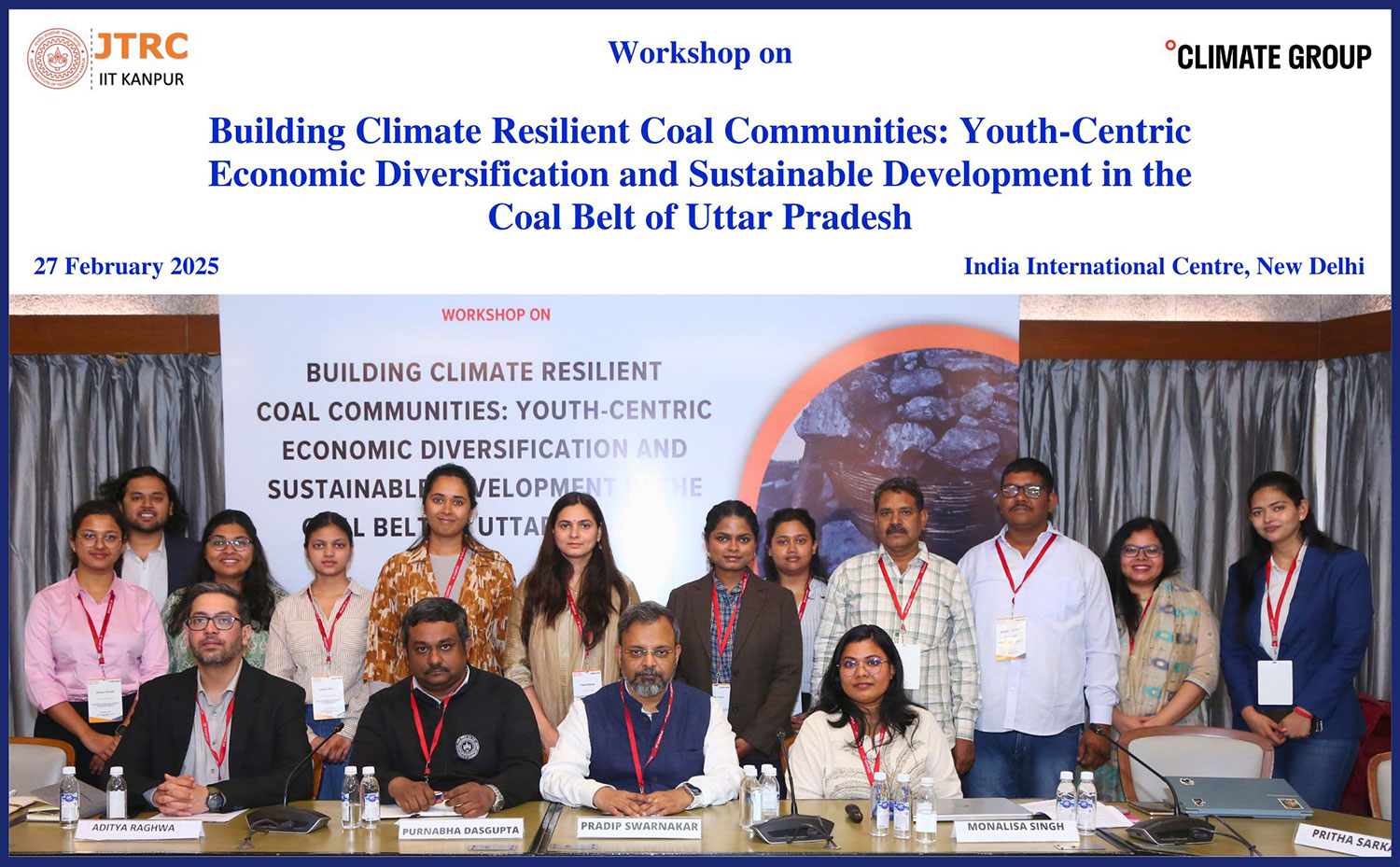
Communicators' Workshop on Renewable Energy in India
Date: February 20-22, 2025
Venue: PBCEC, Visitors' Hostel 1, IIT Kanpur
JTRC IIT Kanpur, in collaboration with the Earth Journalism Network, successfully organized a three-day workshop with journalists focussing on the renewable energy landscape and just transition in India. The workshop provided an overview of the renewable energy situation in Uttar Pradesh and India, highlighting key aspects such as energy efficiency and the challenges and opportunities in transitioning from coal to renewable energy from academic and NGO perspectives.
As part of the workshop, participants also visited the Smart Grid Control Centre and urban and semi-urban pilot sites at the IIT Kanpur campus to gain practical insights into energy management and smart grid technologies. Additionally, discussions were held on India's nuclear energy push through Small Modular Reactors (SMRs).
A key component of the workshop was data journalism for renewable energy, where participants engaged in hands-on sessions to explore effective storytelling using data. Group activities allowed participants to brainstorm and refine potential story ideas, incorporating insights from the data journalism sessions. The workshop concluded with group presentations of their story ideas, fostering collaborative learning and innovative approaches to reporting on energy transition.
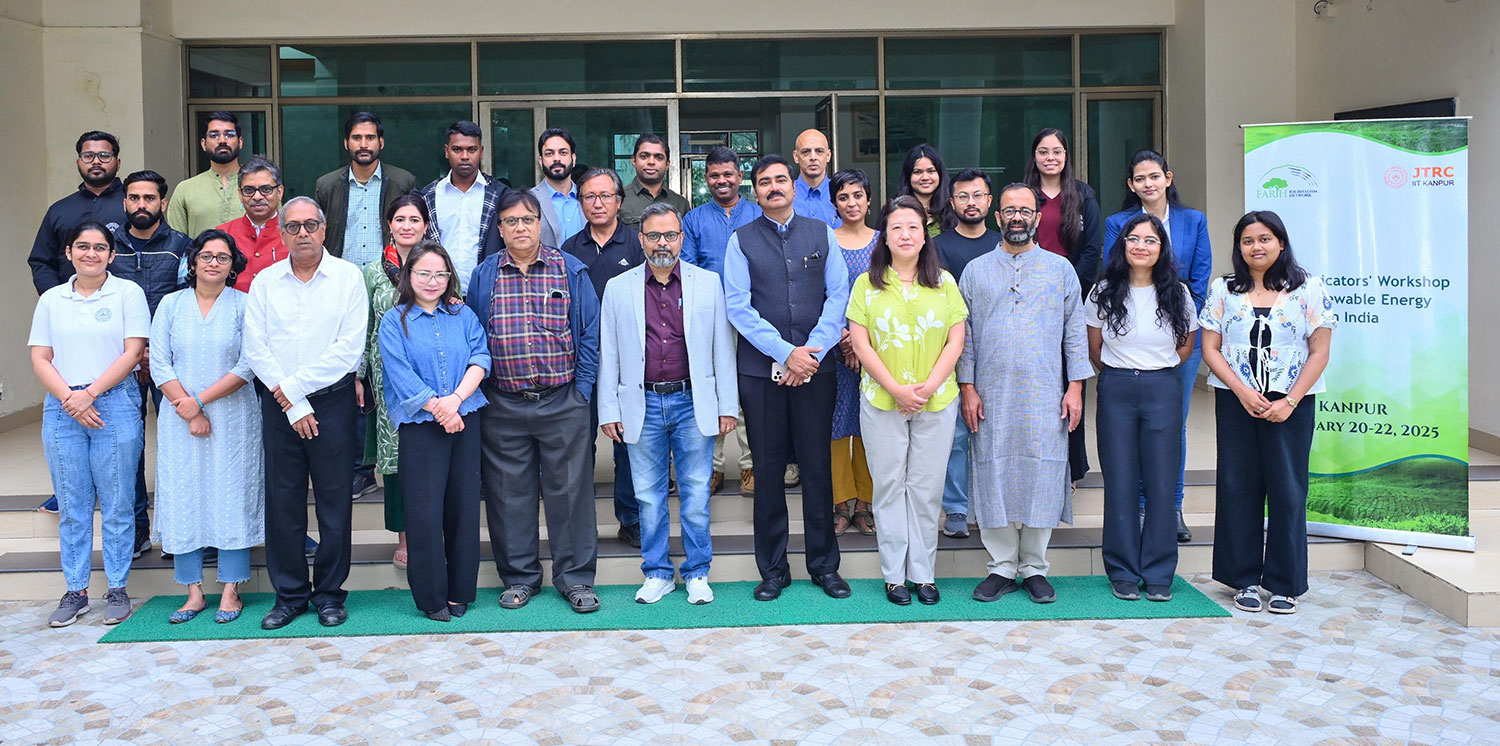
Workshop on Civil Societies and Climate Change: An India-Australia Dialogue
Date: February 10-11, 2025
Venue: PBCEC, Visitors' Hostel 1, IIT Kanpur
Climate change is an epoch-making global challenge that reshapes the dynamics of human societies and their relationship with the environment. Beyond its environmental impacts, climate change demands a fundamental reconsideration of societal values, structures, and priorities. Civil societies-comprising non-governmental organizations, community groups, advocacy networks, and grassroots movements-emerge as critical actors in this transformation. They play a pivotal role in shaping climate discourses, mobilizing action, and redefining the relationship between society and the environment.
With the aim of exploring this intersection of climate change and civil society in varying political contexts, the Just Transition Research Centre, IIT Kanpur (JTRC IITK), in collaboration with the University of Technology Sydney (UTS), organized a workshop titled “Civil Societies and Climate Change: An India-Australia Dialogue" on the 10th and 11th February 2025 at IIT Kanpur.
India and Australia offer contrasting yet complementary case studies. India's socio-economic stratification, coupled with its dependence on climate-sensitive sectors, reveals the interplay between grassroots mobilizations, systemic vulnerabilities, and climate justice. Australia, with its ongoing debates over fossil fuels, renewables, and environmental policies, showcases the tensions and opportunities for civil society engagement in a highly polarized context. Together, these perspectives provided rich comparative insights into the dynamics of civil societies under climate change.

India Just Transition Summit Navigating a People-Centred Low-Carbon Transition for India
Date: October 16-17, 2024
Venue: Hyatt Regency, New Delhi
The India Just Transition Summit, hosted by Just Transition Research Centre of IIT Kanpur and WRI India, served as a research symposium and conference bringing together thought-leaders, policymakers, researchers, civil society, and community representatives to explore diverse perspectives and inclusive strategies towards a people-centred, inclusive, and equitable low-carbon transition in India.
The Summit hosted 250+ participants and 50+ speakers representing diverse stakeholder groups in the country to policy frameworks, technological advancements, and socio-economic impacts. It also created a platform for 30+ research papers (selected from over 150 abstracts, from various research and academic institutions), focussing on different facets of just transition issues and solutions for India, to be presented and discussed.
The event also officially launched the Just Transition Knowledge Network (JETNET), an initiative by JTRC IIT Kanpur.
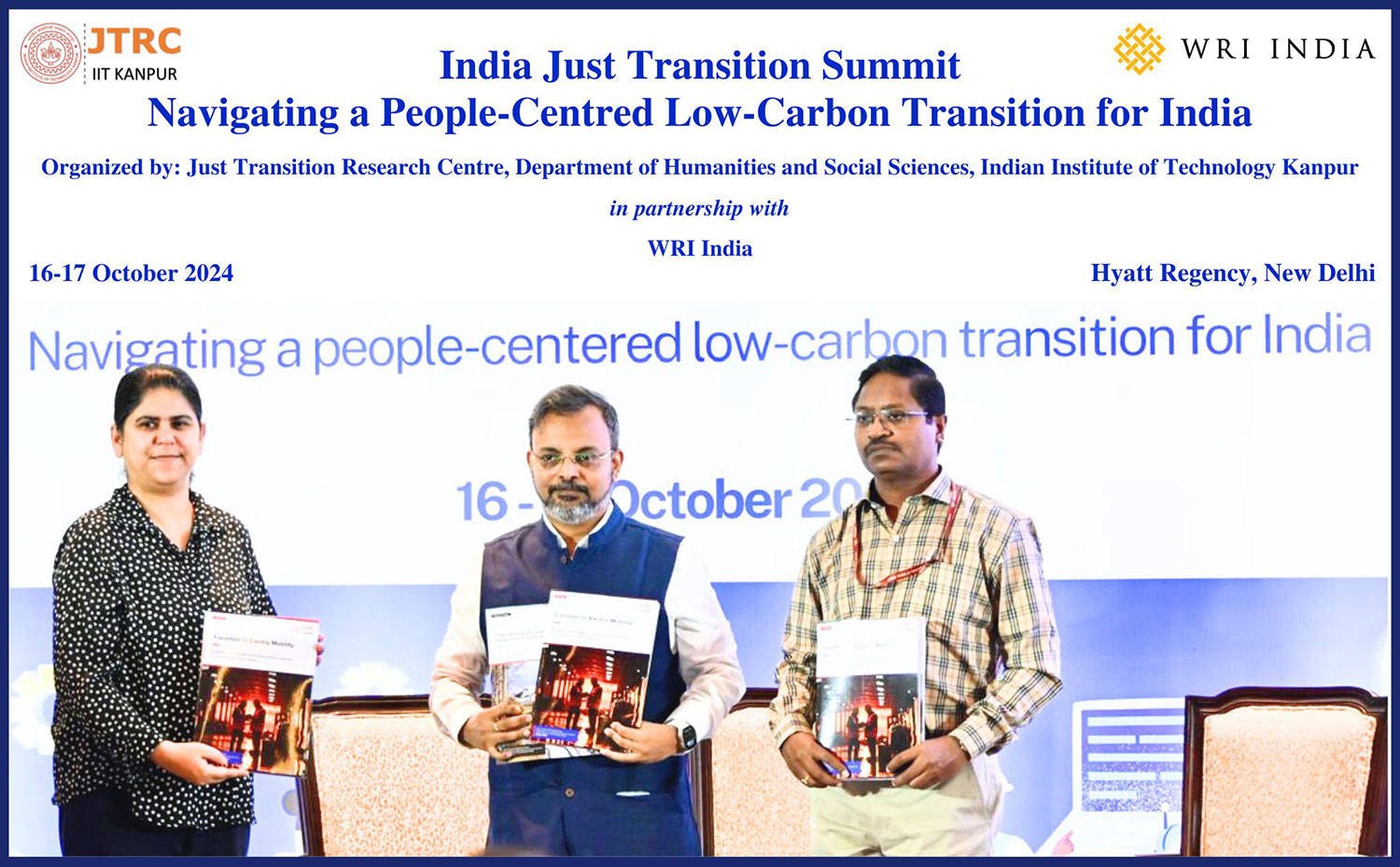
Report Launch Financing Just Transition in India
Date: August 05, 2024
Venue: India International Centre, New Delhi
The Just Transition Research Centre at IIT Kanpur launched Part 1: Climate Finance and Carbon Markets and Part 2: Revenue Allocation Strategies of "Financing Just Transition in India" report on 5th August 2024 at India International Centre, New Delhi.
The launch was followed by a panel discussion on exploring the financial frameworks for a just transition in India. It featured experts including Dr. Kartikeya Singh from Growald Climate Fund, Ms. Vibhuti Garg from Institute for Energy Economics and Financial Analysis (IEEFA) and Dr. Ashish Chaturvedi from UNDP India.
The event saw enthusiastic participation from a diverse array of stakeholders, including ministry officials, government institutes, business firms, research organizations, international bodies, and academic institutes.
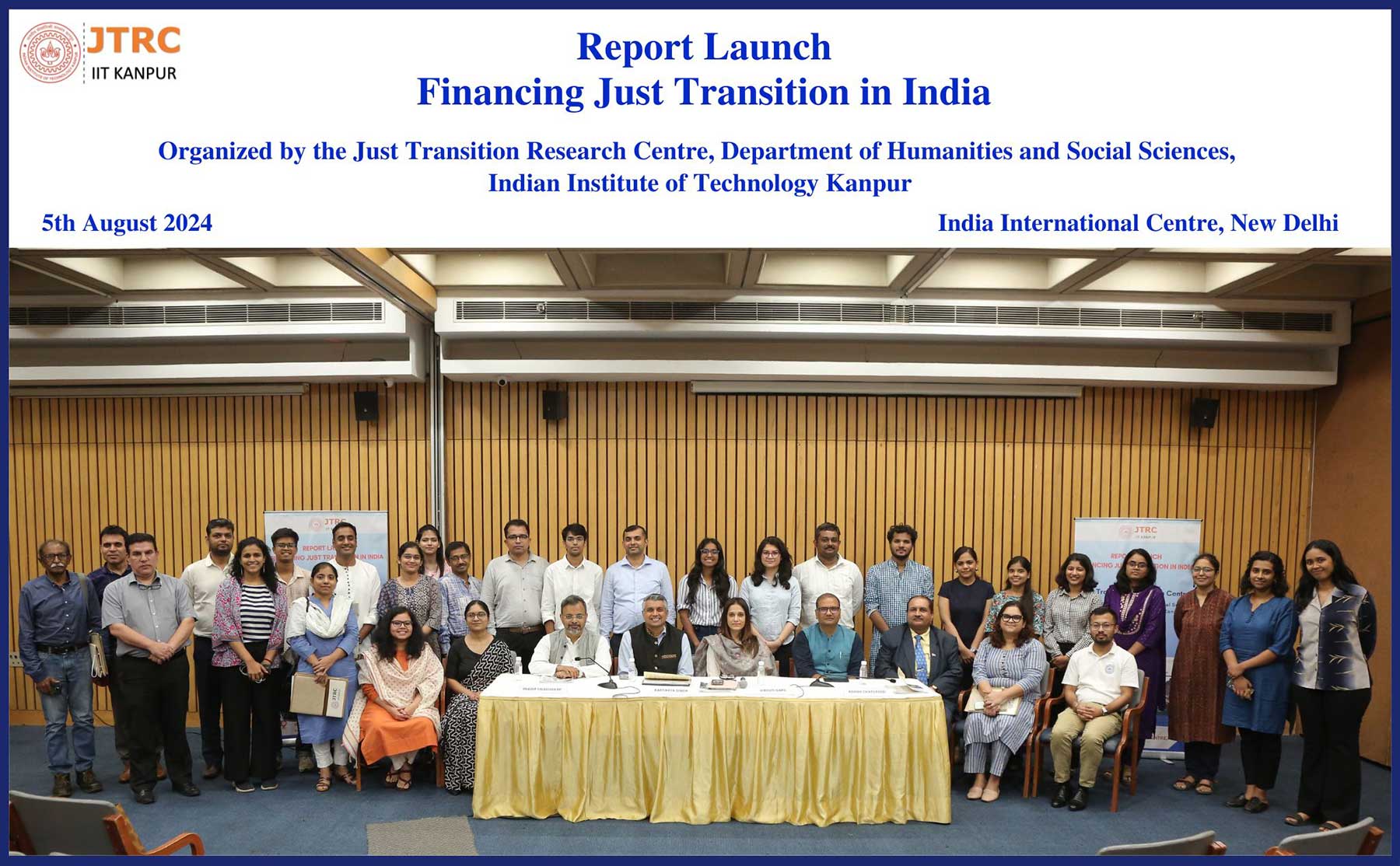
Just Transition Dialogues: Foregrounding Youth for Economic Diversification in Indian Coal Regions
Date: June 18-19, 2024
Venue: The Oberoi, New Delhi
The youth aged 15 to 29 comprised one-fifth of India’s total population. The coal-dependent regions reflected similar demography, making youth one of the key stakeholders in the process of energy transition. To ensure effective economic diversification and development in these regions, it was pertinent to ensure their meaningful engagement in the decision-making process. Policies and programmes for just transition needed to build the capacities of young Indians so that they could rise to the challenges of the changing labour market. This workshop was a significant step towards empowering the youth and shaping their future.
With this backdrop, the Just Transition Research Centre at IIT Kanpur organized a national workshop, recognizing the crucial role of stakeholders. The broader aim was to build a strong discourse and network of stakeholders to create sustainable pathways for youth engagement while contributing to the broader goal of economic diversification. This two-day event was part of the youth-centric just transition dialogue series and aimed to empower the youth and shape their future while contributing to broader economic goals.
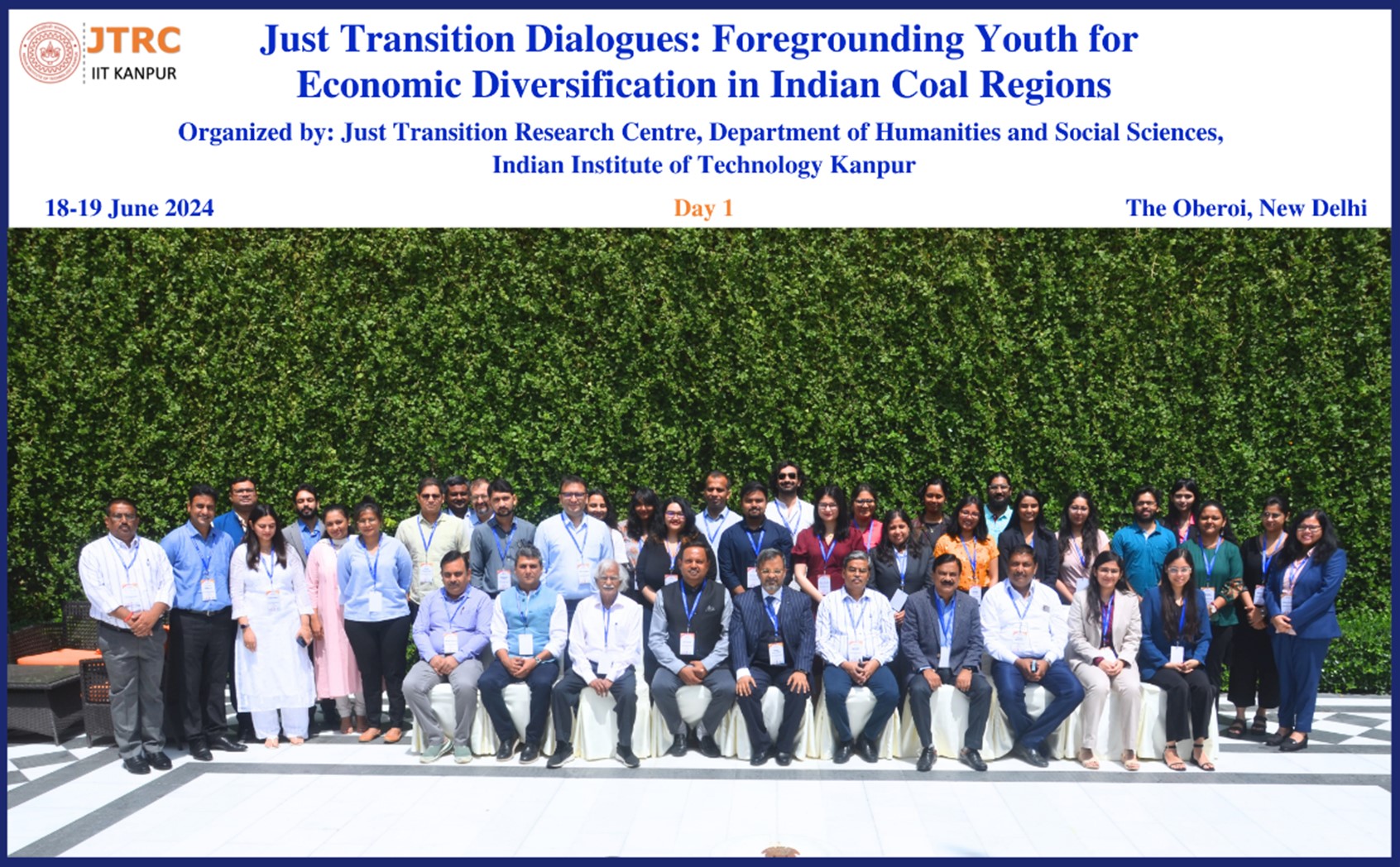
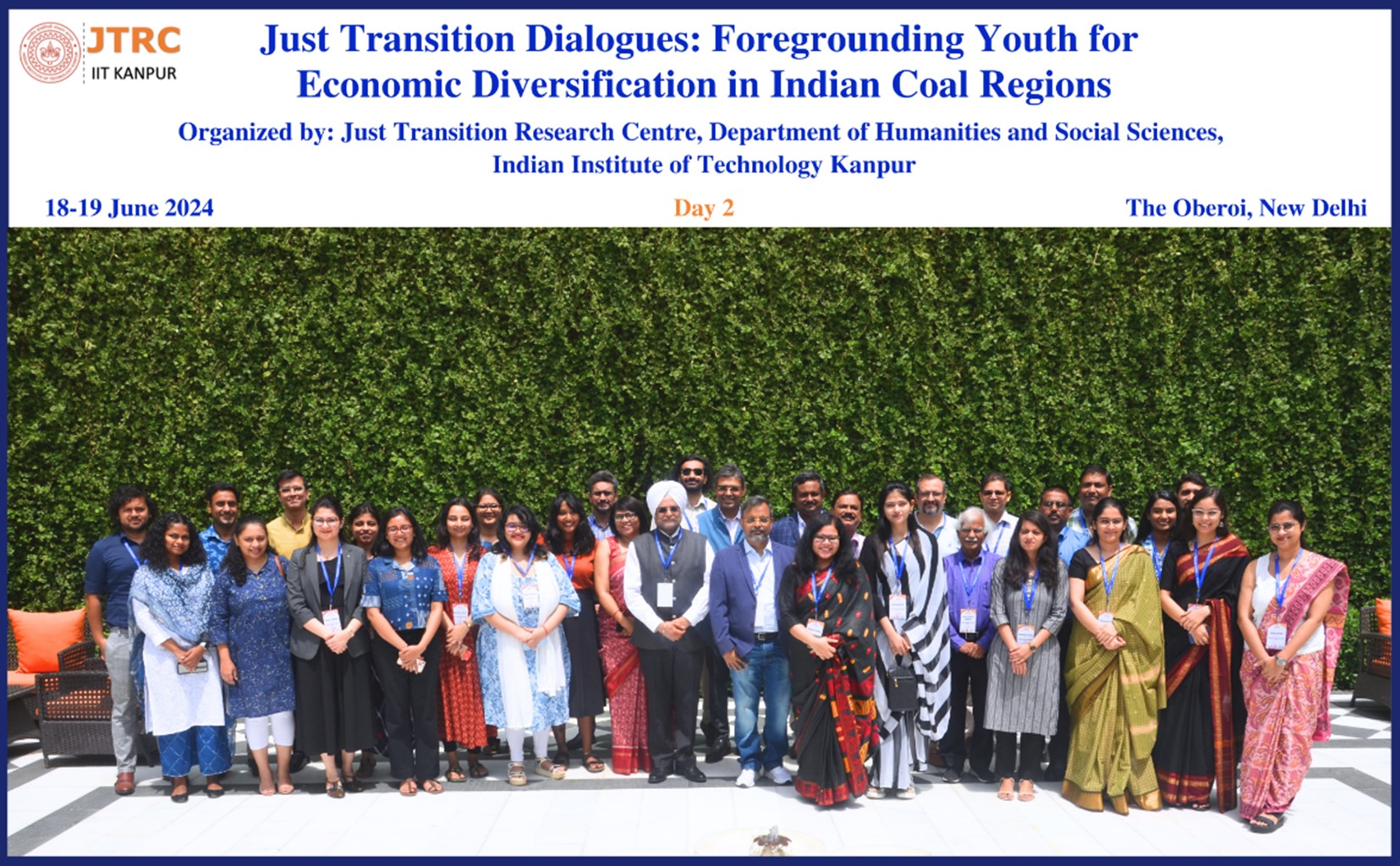
Just Transition Dialogues: Workshop on Technological Transformation of Uttar Pradesh's Brick Kiln Sector
Date: May 14, 2024
Online Mode
Background: India is the world's second-largest brick producer, employing close to 10 million people and churning out more than 250 billion units per annum in over 140,000 kilns. Most of these kilns are concentrated in the greater Indo-Gangetic belt, particularly in the state of Uttar Pradesh, playing a pivotal role in the nation's construction sector by supplying critical materials. However, the prevalent use of antiquated technologies in these kilns has led to significant environmental and health challenges. These issues stem from inefficiencies and pollution, positioning UP as a critical area for intervention and improvement within this vital industry.
Aim: The proposed workshop was designed to contribute towards a transformative change in UP's brick kiln sector and to build a knowledge base for a just transition. It aimed to introduce and advocate for the adoption of advanced technological solutions, prioritize environmental conservation, and establish innovative financing models suitable for the region's unique requirements. This initiative sought not only to enhance the operational efficiency of brick kilns but also to align them with sustainable development and just transition principles, ensuring a balance between economic growth and environmental stewardship. Through collaborative efforts and focused discussions, we envisioned a greener, more resilient, and just brick kiln industry in Uttar Pradesh, contributing to the broader goals of sustainable development.
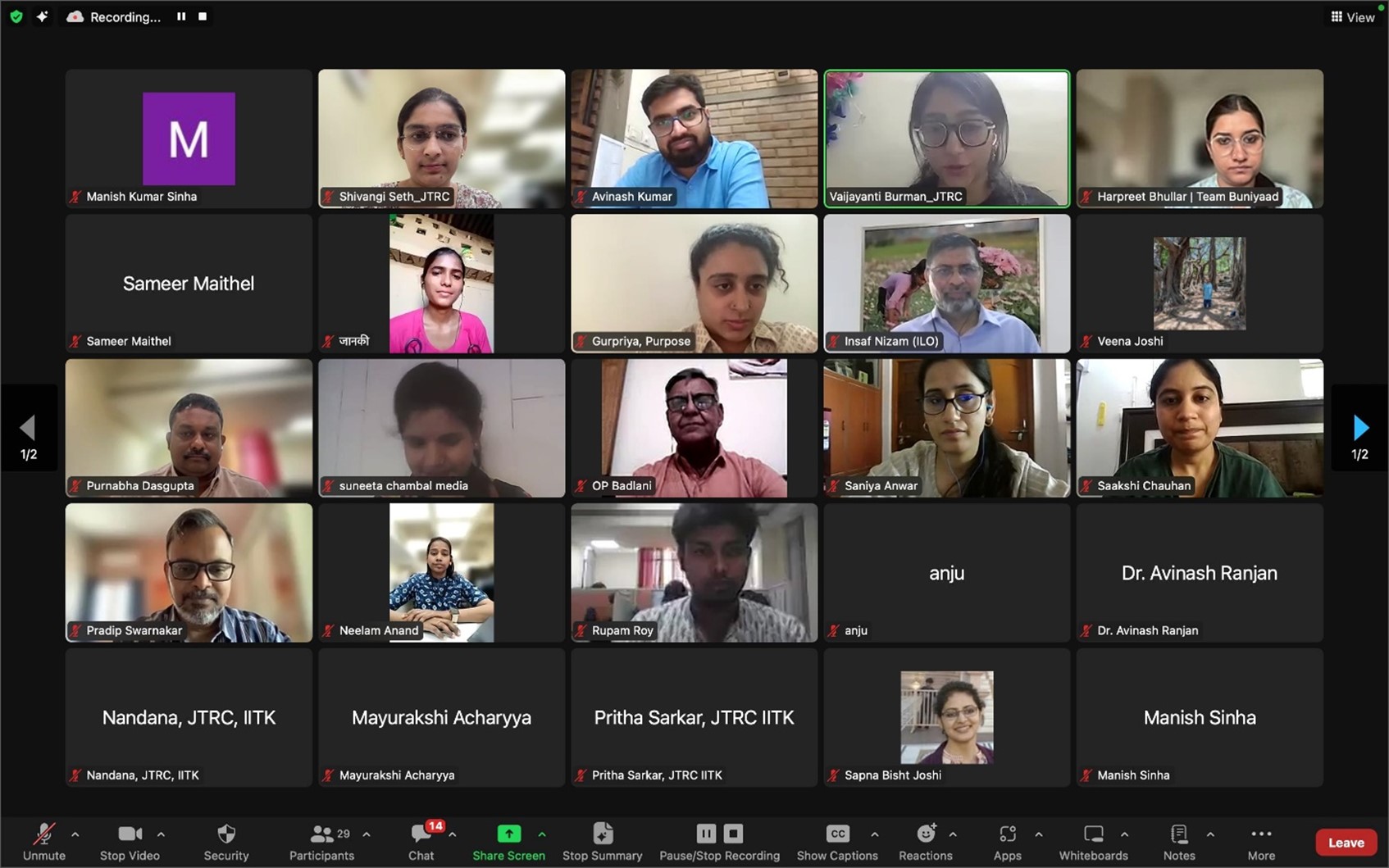
International Workshop on Social Research Methodologies in Just Transition: Capacitating Sectoral Leaders
Date: March 27-28, 2024
Time: 9:30 AM to 05:00 PM
Venue: IIT Kanpur
The Just Transition Research Centre at the Indian Institute of Technology Kanpur, in collaboration with the University of Technology Sydney an international workshop focusing on social research approaches within the context of just transition. The workshop was supported by the Scheme for Promotion of Academic and Research Collaboration, Ministry of Education. The workshop aimed to explore various methodologies applicable to studying just transition processes in energy, agriculture, and mobility sectors. Key themes emerged regarding methodologies for climate change and just transition research. The workshop featured plenary sessions, networking opportunities, and targeted academicians and experts from energy, agriculture, sociology and economics domain. Expected outcomes included enhanced understanding of methodologies, identification of best practices, development of collaborative networks, and generation of insights for policy development in just transition initiatives.
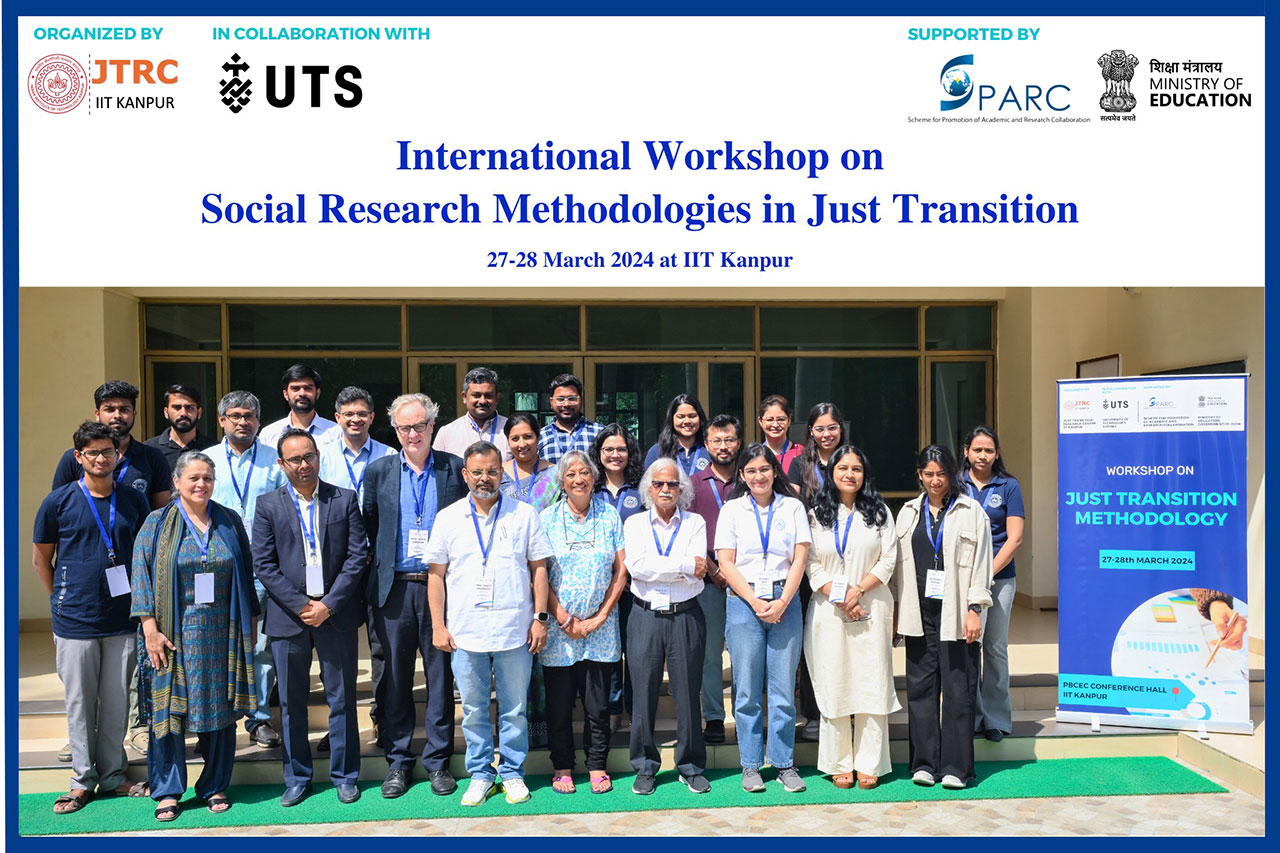
Just Transition Dialogues: Empowering Brick Kiln Sector Energy Transition in Uttar Pradesh through Grassroots Engagement
Date: March 15, 2024
Time: 9:30 AM to 04:15 PM
Venue: IIT Kanpur
The conference aimed at fostering a just transition towards cleaner energy sources and sustainable practices in the brick kiln sector in Uttar Pradesh. The event brought together stakeholders to review policies, showcase clean production technologies, highlight grassroots perspectives, explore inclusive stakeholder engagement, and unveil capacity-building initiatives. Expected outcomes include a roadmap for energy transition, a clear understanding of challenges and opportunities, and the establishment of a collaborative stakeholder network.
This was the first just transition centric conference in the Indian Brick Kiln Sector which opened a platform for stakeholders to brainstorm, present views and recommend actionable strategies for just energy transition in the sector.
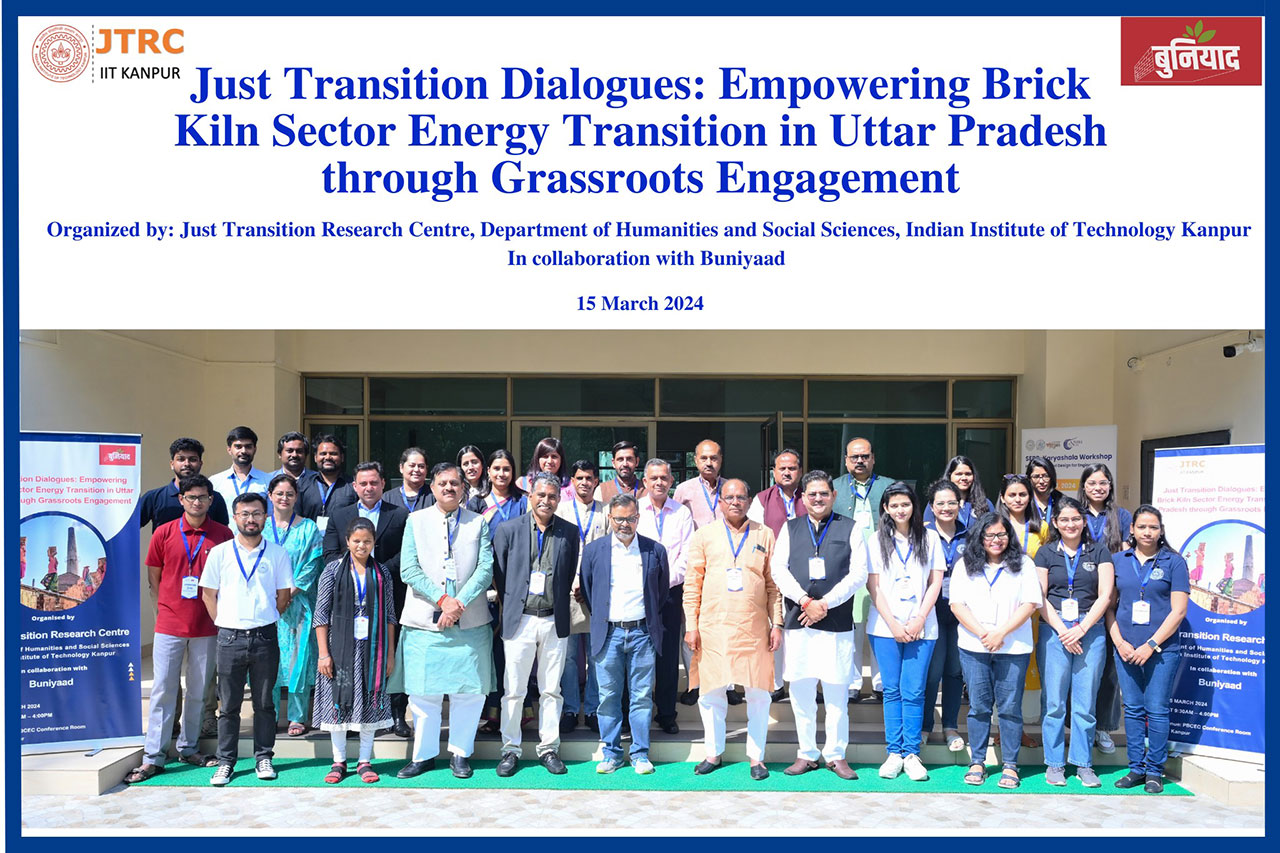
Just Transition Dialogues: Consultation with Key Stakeholders in South Eastern Coalfields Limited
Date: March 5, 2024
Time: 9:00 AM to 04:30 PM
Venue: Management Development Institute, Bilaspur, Chhattisgarh
The concept of a just transition, ensuring fairness in the shift from fossil fuels to renewables, lacks a clear policy roadmap. To address this, a multi-stakeholder, inclusive, and bottom-up approach is crucial. Public Sector Units (PSUs) and trade unions, closely linked to grassroots conditions, play a vital role, especially in India's coal industry facing complex socio-economic and technological challenges.
As the Indian coal sector is predominantly publicly owned, PSUs like Coal India Limited are uniquely positioned to develop fair transition plans. The trade unions at the subsidiary level are instrumental in facilitating economic diversification, fair compensations, and re-skilling for workers affected by coal phase-out. This interactive session between SECL management, coal worker unions and JTRC-IITK aims to initiate a regional discussion on just transition, mapping challenges, and identifying points of intervention. Key themes include existing policies, government acts, challenges faced by SECL management and trade unions, and roles in ensuring a just energy transition.
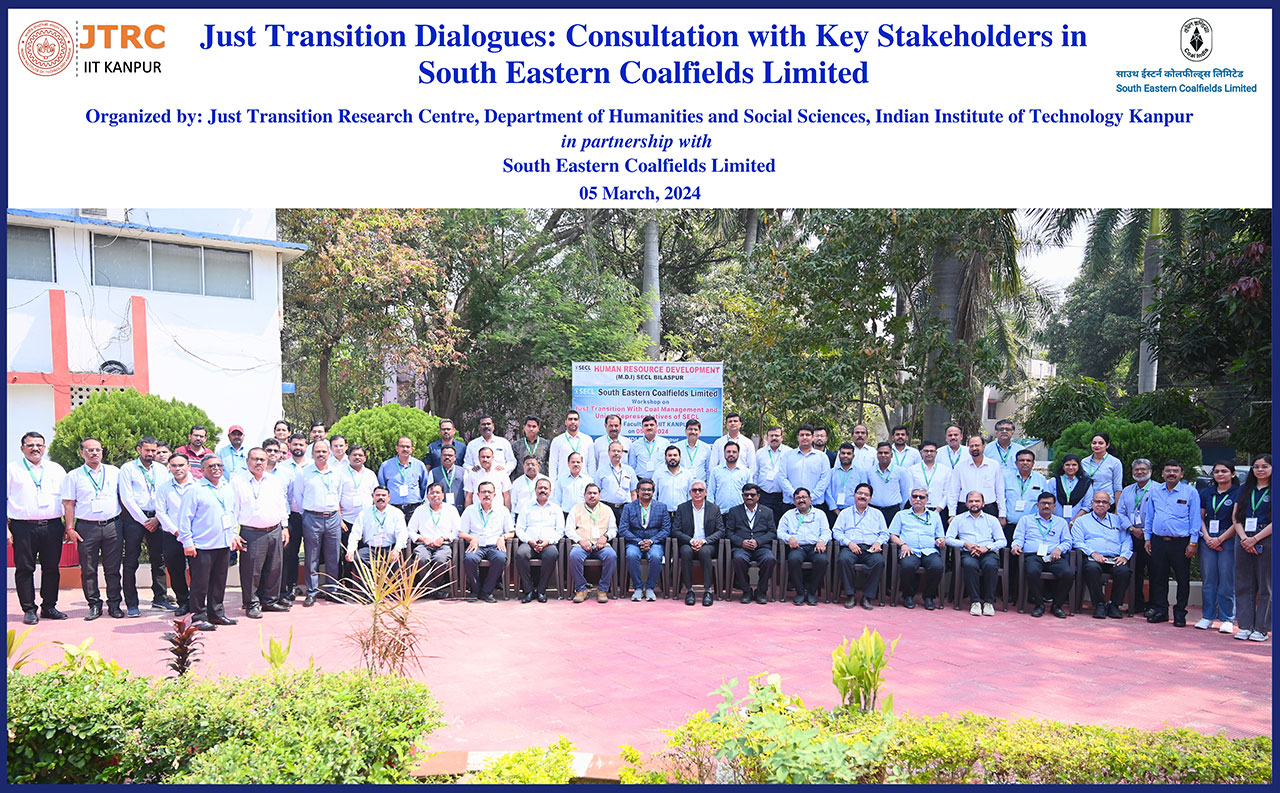
Just Transition Dialogues: Empowering Youth for Economic Diversification in Coal Regions of Uttar Pradesh
Date: February 6, 2024
Time: 10:30 AM to 05:20 PM
Venue: Banwasi Sewa Ashram Office, Govindpur, Sonebhadra, Uttar Pradesh
The regional workshop, hosted by the Just Transition Research Centre at IIT Kanpur in association with Banwasi Sewa Ashram, focuses on empowering youth in India's coal-dependent regions, specifically Singrauli and Sonebhadra. Recognizing the diverse social, economic, and ecological aspects, the event aims to foster meaningful youth engagement in crafting just transition policies. With the youth representing one-fifth of India's population and being the next generation in fossil-fuel dependent areas, their active involvement is crucial.
Objective of the workshop:
To know experiences and work of stakeholders in Singrauli and Sonebhadra region
Understand guidelines, tools, and techniques that help maximize meaningful youth participation
Understand how youth can enjoy the benefits of economic diversification in the process of just transition in Uttar Pradesh’s coal regions
Discussion about social, economic and environment related problems of the area and their relationship with youth
Understanding the skills, employment and industry opportunities available to youth
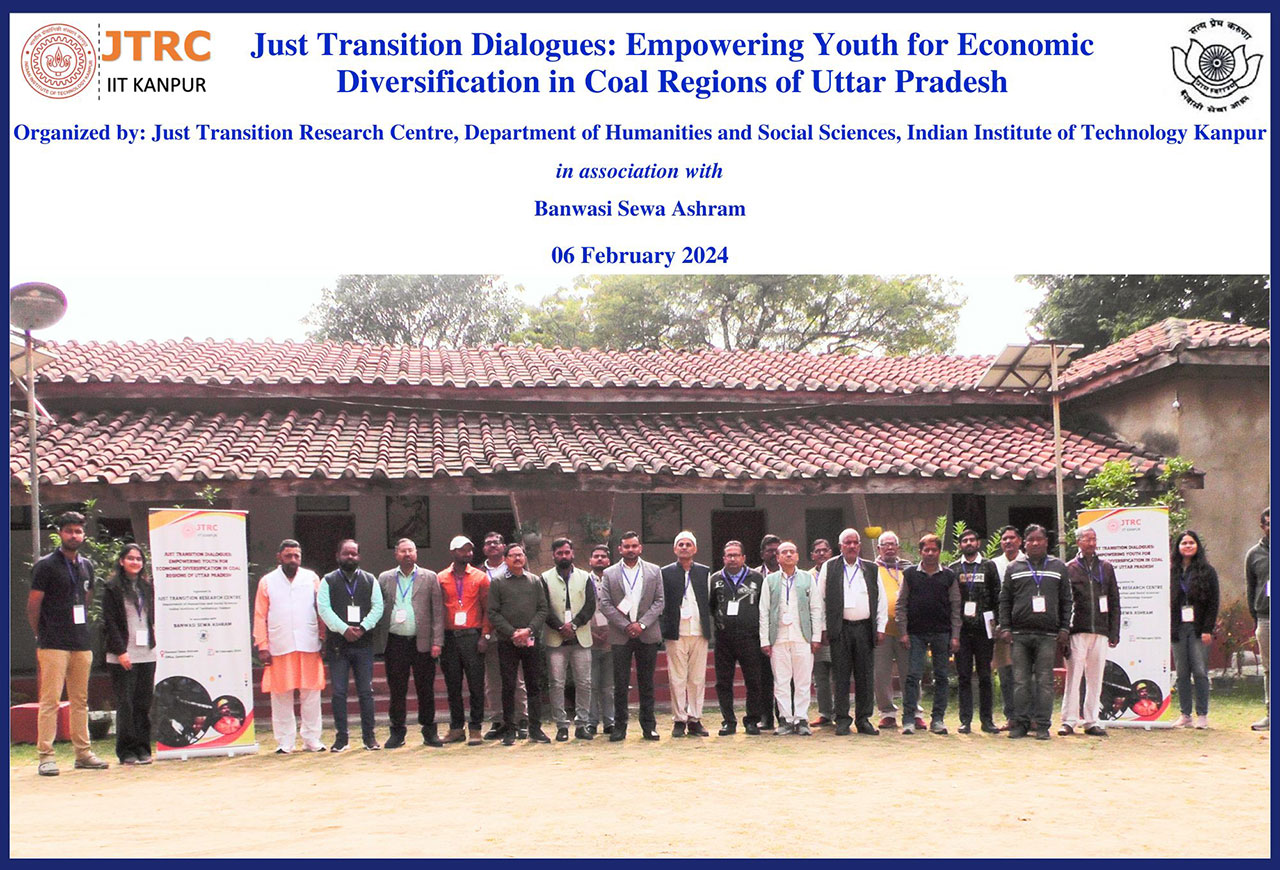
Online Session on Just Transition for Directors of Coal India Limited and Subsidiaries
Date: December 02, 2023
Time: 5:00 PM to 0:30 PM
Just Transition Dialogues: Empowering Youth for Economic Diversification in Coal Regions of West Bengal
Date: November 25, 2023
Time: 9:45 AM to 02:00 PM
Venue: The Peerless Inn, Durgapur, West Bengal
The Just Transition Research Centre at IIT Kanpur is organized a regional workshop focusing on the vital role of youth in the just transition process in coal-rich regions of West Bengal. Recognizing the diverse needs of these communities, the workshop aims to provide guidelines and tools for meaningful engagement, addressing social, economic, and ecological perspectives.
The interactive session aimed to gather insights from key stakeholders nationwide, fostering a thorough understanding of their perspectives and experiences related to youth participation in the economic diversification process in West Bengal's coal districts.
Objective of the workshop:
The primary objective was to lay the foundation for a comprehensive research and intervention program that bridges the skill gap, aligns youth aspirations with economic diversification, and fosters sustainable employment opportunities in West Bengal's coal regions.
As an outcome a clear understanding of challenges and opportunities in West Bengal's coal regions regarding economic diversification and youth employment were identified. It also paved the way to establish a network of stakeholders committed to collaborative efforts in addressing challenges for developing a roadmap for future intervention programs aligning youth capabilities with economic diversification.
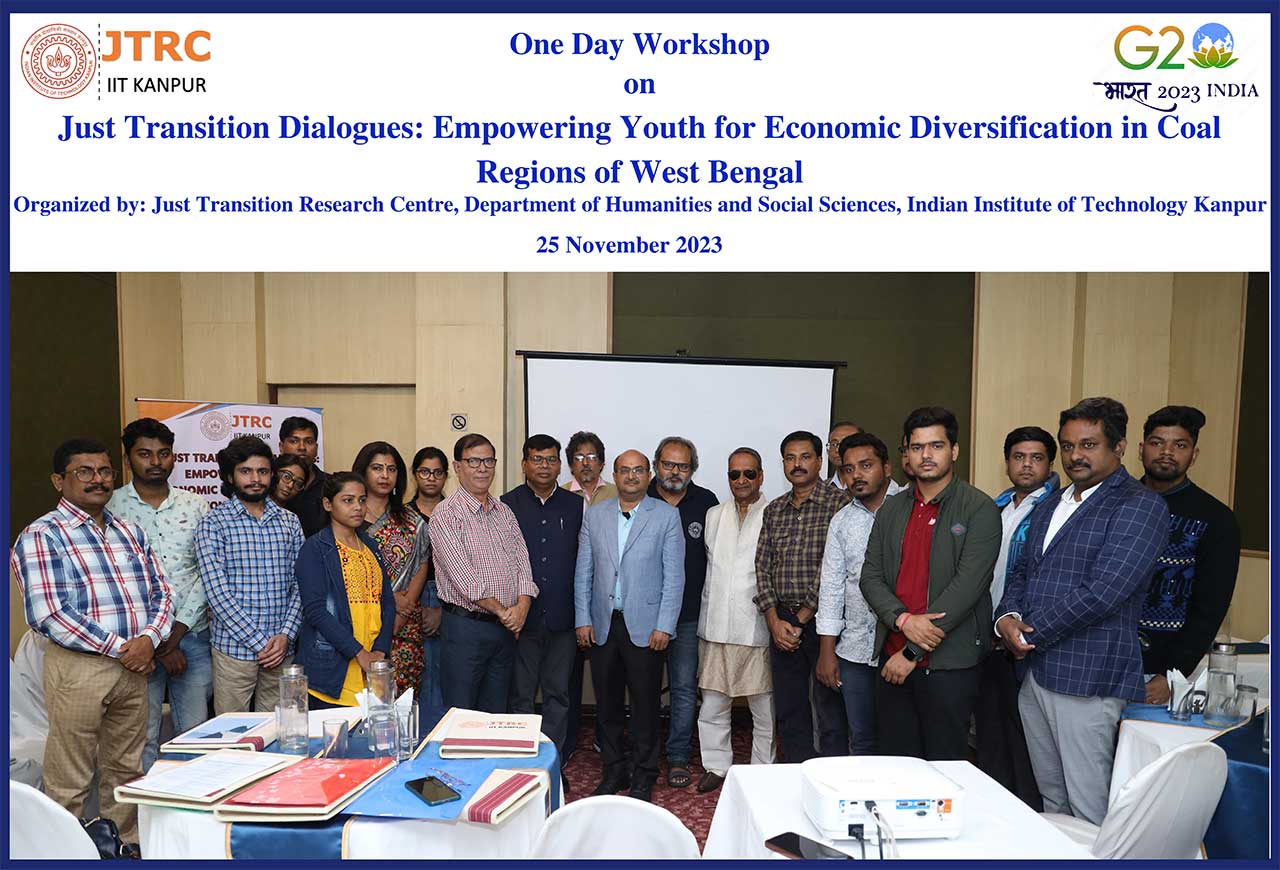
Just Transition Dialogues: Empowering Youth for Economic Diversification in Indian Coal Regions
Date: September 22, 2023
Time: 10:00 AM to 03:30 PM
Venue: PBCEC Conference Hall, IIT Kanpur
The Just Transition Research Centre at IIT Kanpur is organized an inception workshop focusing on the vital role of youth in the just transition process in coal-rich regions of India. Recognizing the diverse needs of these communities, the workshop aims to provide guidelines and tools for meaningful engagement, addressing social, economic, and ecological perspectives.
This inception workshop served as the first step in a vital journey towards empowering the youth in Indian coal regions to play a pivotal role in the region's economic transformation. By answering the research questions and building a strong network of stakeholders, the workshop aimed to create sustainable pathways to prosperity for the youth while contributing to the broader goal of economic diversification.
Objective of the workshop:
The primary objective was to lay the foundation for a comprehensive research and intervention program that bridges the skill gap, aligns youth aspirations with economic diversification, and fosters sustainable employment opportunities in Indian coal regions.
This interactive event marked the opening for a series of workshops, conferences, and dialogues on the various issues young people face in coal-dependent regions of India. It will bring together the key stakeholders in the transition process from all across the nation. Our goal is to get a more thorough understanding of the stakeholders' perspectives and experiences regarding youth participation in the economic diversification process in Indian coal districts.
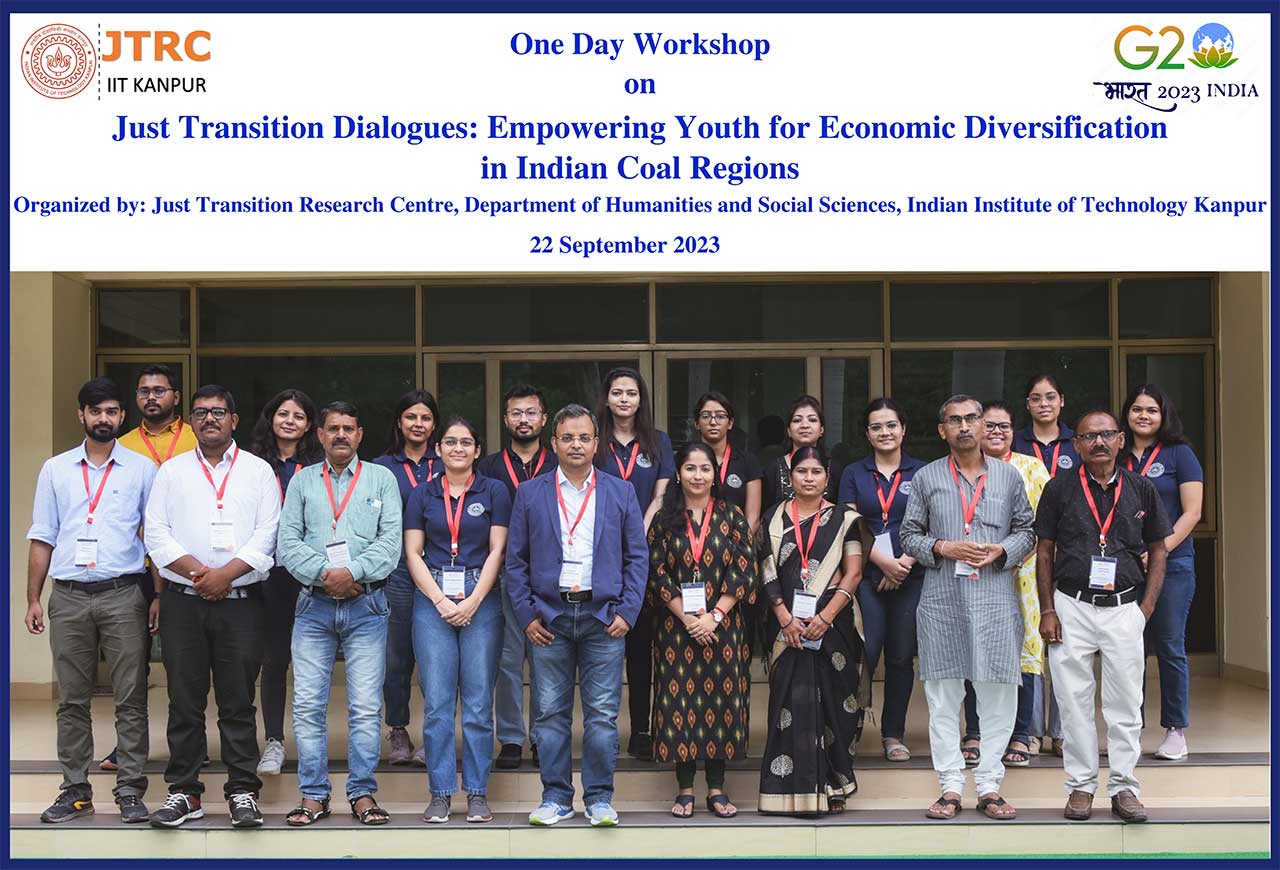
Managing Energy, Economic, and Environmental Transition: A Subnational Exchange
Co-hosted by the Center for Strategic and International Studies and the Indian Institute of Technology Kanpur
Date: July 27, 2023
Time: 10:30 AM to 5:40 PM
Venue: The Oberoi, New Delhi – Nilgiri Hall New Delhi, India
Balancing climate action, energy access, and economic development through energy transition will continue to bear unique social, economic, and political challenges for coal-dependent economies. The breadth, depth, and variability of the transition calls for planning, innovation, collaboration, and knowledge-sharing to help regions and communities support one another through transition.
The Center for Strategic and International Studies (CSIS)—in partnership with the Indian Institute of Technology Kanpur (IITK)—welcomes you to a private workshop on energy transition and its implications for subnational, coal-dependent regions. State policy leaders, non-governmental organizations, and academics from India, South Africa, and the United States will share experiences, policy mechanisms, and technical considerations of planning for and managing transition at the subnational level.
Share knowledge and on-the-ground perspectives on challenges, impacts and strategies for subnational policymakers who anticipate or are currently managing transition.
Establish a dependable network of policymakers and practitioners for sharing contextually appropriate solutions to tackle immediate transition challenges.
Build a common understanding of the risks of unmanaged and unprepared transition.
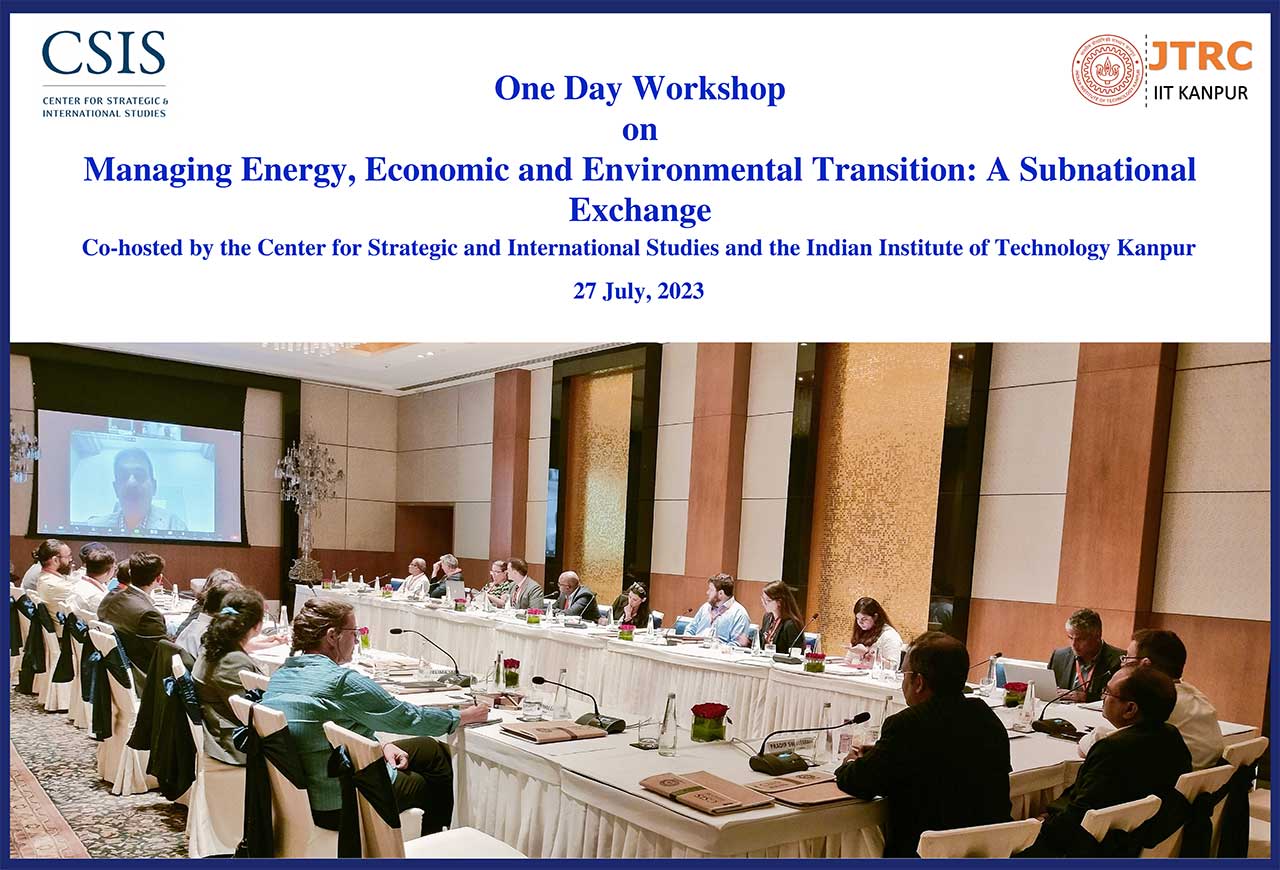
Just Transition Dialogues: Developing Pathways for the Indian Coal Industry
Date: July 12th -13th, 2023
Time: 9:30 AM to 3:45 PM
Venue: VH-1, IIT Kanpur
In the run-up to the Paris Agreement in 2015, India committed to an ambitious target of scaling up its renewable energy capacity by 175 GW by 2022. This was updated to 500 GW at the Glasgow climate conference in 2021. A clear policy roadmap is required to envision the nature of interventions to drive this energy transitions efficiently. The challenge is to frame a policy that governs the techno-economic dimensions of the energy transition and the human and social aspects of achieving a just transition.
In a pioneering effort, the issue of just transition was discussed in the G20 2023 Third Energy Transition.
IIT Kanpur also discussed essential themes to be included in the transition planning for India.
This Interactive session attempted to create a platform for CIL subsidiaries to deliberate and develop a comprehensive, just transition pathway for the coal industry. The following are the objectives of our workshop:
To conduct an in-depth analysis of the socio-economic challenges regarding opening and closing mines.
To prioritize the welfare of workers in the coal industry by examining the role of CIL subsidiaries.
To examine the distribution of CSR and DMFT funds.
To address the technological, financial, and legal aspects of clean energy innovation and achieving Net Zero.
To develop a multistakeholder framework to guide a comprehensive, just transition pathway.
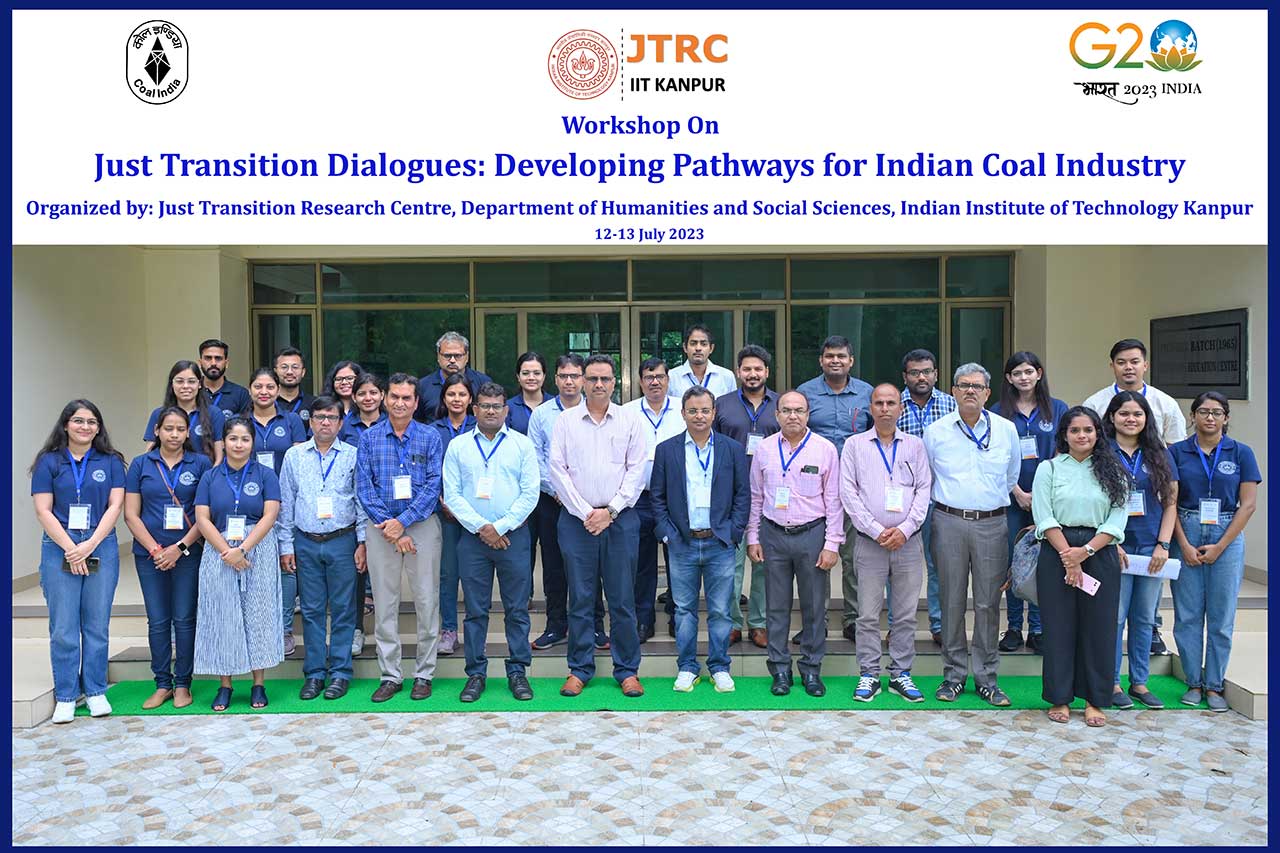
Just Transition Dialogues: Consultation with Key Stakeholders in MCL
Date: July 03, 2023
Time: 9:00 AM to 4:30 PM
Venue: DT Conference Hall, MCL HQ Burla, Sambalpur
The transition from fossil fuels to renewables is an imperative step towards sustainable energy practices. However, the shift brings about socio-economic and technological complexities, particularly affecting industries like the Indian coal sector. To address these challenges, a comprehensive and inclusive policy framework for a "just transition" is essential. This interactive session aimed to create a platform for representatives from Mahanadi Coalfields Limited (MCL) management and coal worker unions to engage in a regional discussion on the concept of just transition.
The session aimed to foster a shared understanding of the just transition concept, establish a foundation for collaborative policymaking, and encourage ongoing engagement between stakeholders. By facilitating a regional discussion, the interactive session seeks to lay the groundwork for a fair and inclusive energy transition in the Indian coal industry, ensuring the well-being of both workers and communities.
This interactive session helped create a platform for representatives from MCL management and coal worker unions to initiate a regional discussion on the issue of just transition. The following themes led the discussion:
Mapping regional challenges:
How is MCL approaching just transition: Existing policies (CSR, R&R, mine closure, land ownership, social and health infrastructure policies, and alternative livelihood plans)
Recent amendments in policies and laws regarding just energy transition.
Role of management and trade unions: Challenges and opportunities
Mapping points of intervention: Scope of research and collaboration opportunities.
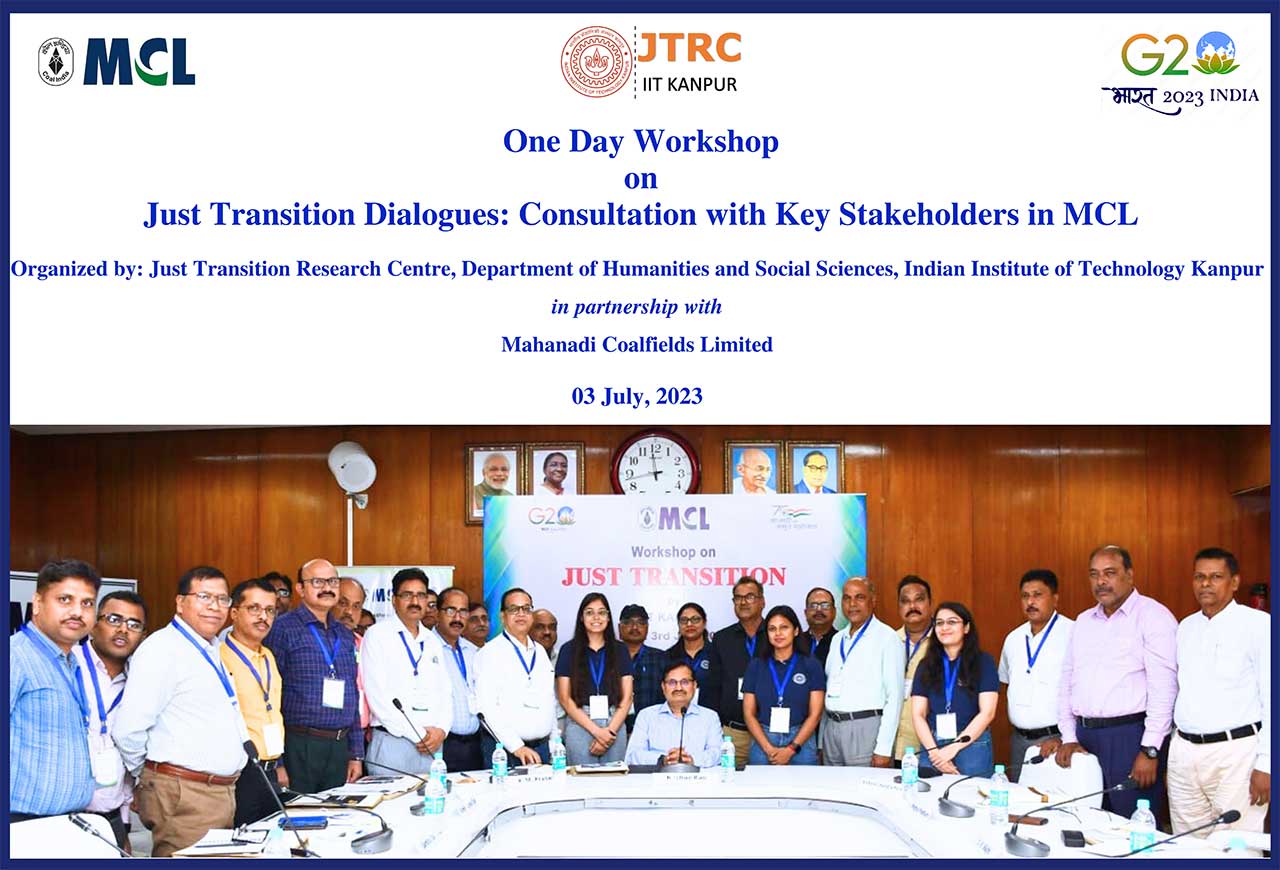
Just Transition Dialogues: Foregrounding the Workforce - Phase 2
Date: April 08, 2023
Time: 9:00 AM to 4:30 PM
Venue: Le Lac Sarovar Portico, Ranchi
The Just Transition Research Centre at IIT Kanpur organized an interactive session in Ranchi, Jharkhand, focusing on the crucial role of trade unions in facilitating a fair and equitable transition from fossil fuels to renewables. The concept of a just transition emerged from the trade unions' response to environmental legislation in the United States, and it aims to balance the interests of workers and environmental protection during the shift to renewable energy.
The workshop acknowledges the pivotal role of trade unions in ensuring a smooth transition for workers in the coal sector. It emphasizes their involvement in planning economic diversification, advocating for fair compensation, and facilitating the re-skilling of workers for green jobs. Despite their importance, trade unions have been underrepresented in the energy transition discourse./p>
This interactive session attempts to initiate a discussion on such engagement, especially with the trade unions. The following themes will lead today’s discussion:
What are the existing challenges that the trade unions have faced in the past 5 years at the subsidiary level regarding formal, contractual, and informal workers?
What are trade union's expectations from the government, coal companies, and JTRC-IITK?
What role will the trade unions play at the subsidiary level for workers’ welfare including for formal, contractual, and informal workers?
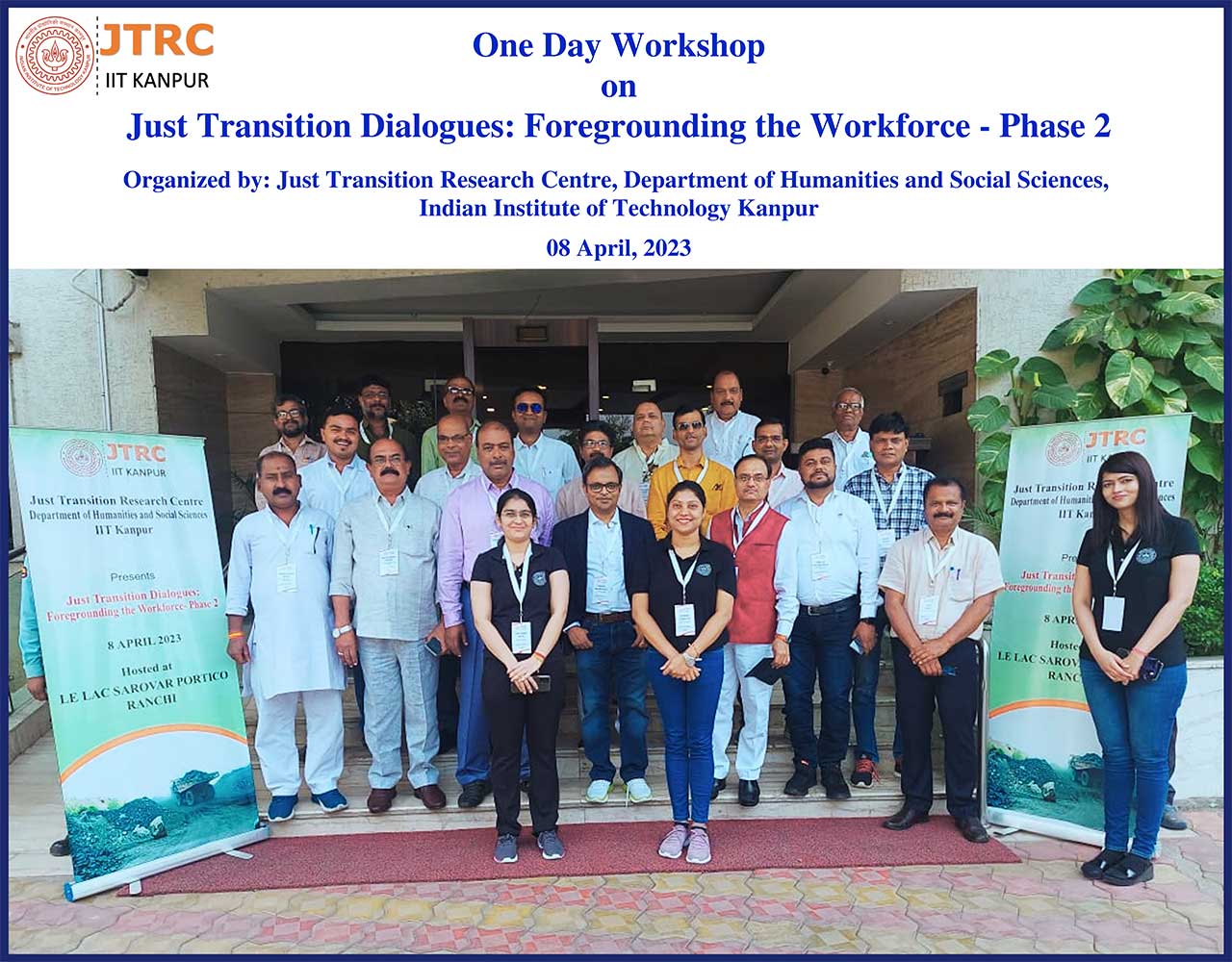
India’s energy transitions – social risks, challenges, and opportunities
Organised by the Centre for Social Responsibility in Mining, Sustainable Minerals Institute,
The University of Queensland, Australia
Hosted by the Just Transition Research Centre, IIT Kanpur
16-17 November 2022
India is a key player in global energy transitions. With a rapidly expanding middle class, a growing population, and a national drive towards building greater industrial and manufacturing capabilities, India’s energy demand is set to grow at an unprecedented pace. The IEA (2021) estimates that India’s growth rate in energy demand is already three times the global average, much of which is satisfied by its prominent coal sector. This growing demand for energy provides a particular impetus to India’s ambitious energy transition plan.
India’s energy transition, however, presents numerous challenges. This workshop will focus on three
specific, but inter-related issues. First, and foremost, is its extensive reliance on coal for energy production. This reliance is not only technical and economic in nature, but also deeply social and cultural. Additionally, the potential impacts of phasing down (or phasing out) coal are likely to be localised and thus acutely felt in some of the country’s most socially disadvantaged regions and communities.
The second issue for coal-reliant regions is the absence of well-planned economic diversification options. The question of ‘if-not-coal, then-what’ remains unanswered.
The third issue critical for India’s energy transitions is the development of renewable energy. Two concerns are particularly important in this regard: the development of large-scale non-fossil fuel energy projects; and the supply of minerals and metals needed to help build much of the ‘green’ energy sector.
Specifically, the workshop will endeavour to address the following questions:
- What are the key roles and responsibilities across diverse stakeholder groups in India’s coal transition process?
- What and where are some of the ‘transition’ pressure points likely to be over the long-term?
- What social risks can disrupt India’s energy transition over the short to medium term?
- What enabling factors are needed to ensure the process and outcomes of India’s coal transition are both socially just and economically robust?
- What is the relevance of international experiences with coal transitions for the Indian context?
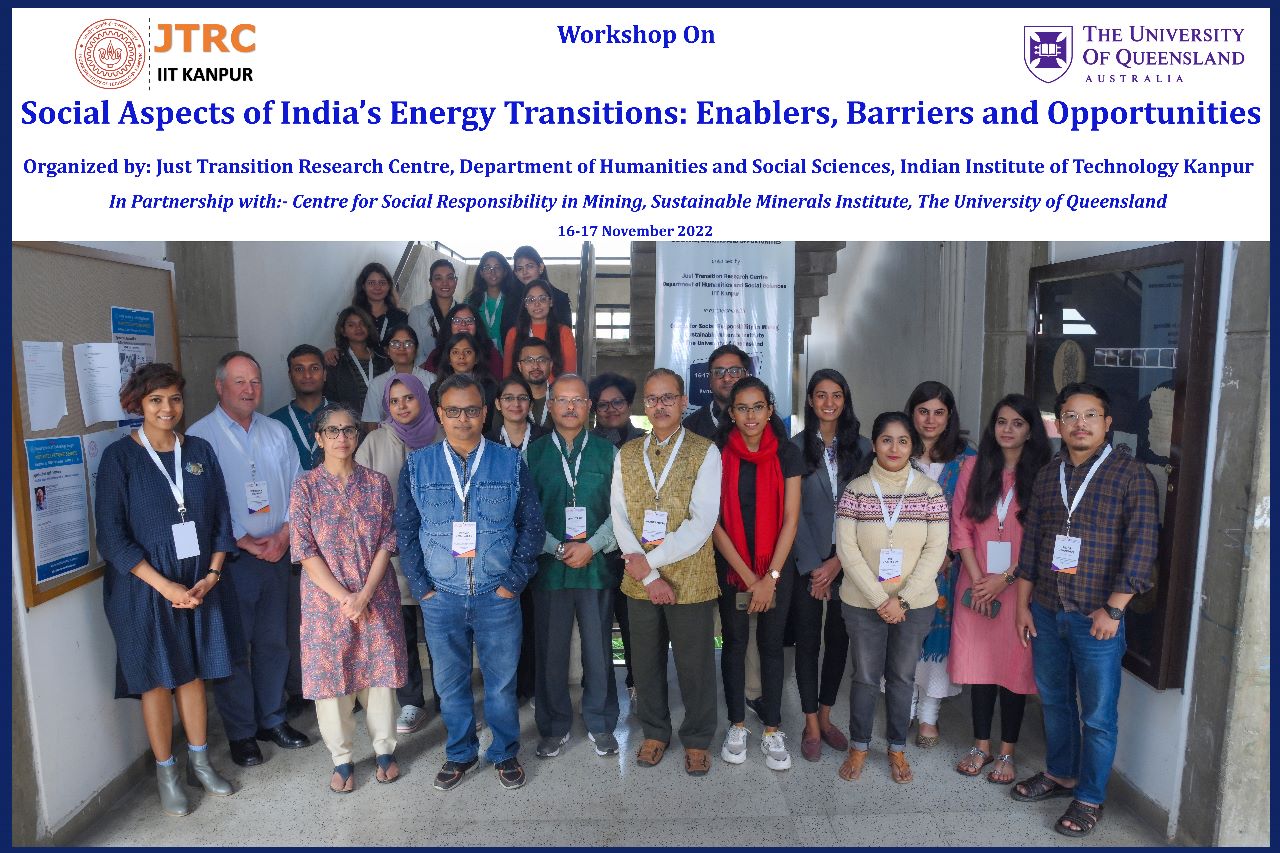
Online Event on Mobilising Finances for Just Transition
Date: October 7, 2022
Time: 10:00 AM to 12:00 PM
The need for just transition is being realised globally as the countries make the climate crisis- induced transition away from fossils towards renewables.
As the transition unfolds, the challenge for the countries is to adapt this concept according to their national context and incorporate it into actual policy- making. The acceptance and legitimacy for the new changes must come from the people and communities directly or indirectly dependent on the current fossil-fuel sector since this workforce will be most acutely affected by the transition.
With the deep-rooted, historical, and socio-economic dependence on coal, India's challenge is more complex. First, the sector is already riddled with socio-economic inequalities in terms of caste, indigenous identities, and gender. Second, the coal-rich regions have remained economically backward, less dynamic, and diverse in terms of employment opportunities, resulting in people depending on employment in coal mines. In the transition process, this lack of economic diversification will further deepen the problem of unemployment and underemployment. Third, a large informal workforce complicates the process further. India has an entire value chain with multiple sectors such as railways, steel, etc depending on coal. If not considered, they risk being excluded from any sustainable livelihood opportunities and ecosystem rehabilitation.
Dealing with such complex set of issues will require diverse resources, the most important being finances. Diversifying the economy, reskilling of workers, and rehabilitating the coal dependent communities will need sufficient and sustained financial resources. For just transition to materialise the required finances will have to be mobilised, equitably distributed, and efficiently spent.
Through this online event we will try to explore the various ways and avenues of mobilising and allocating resources for just transition. The event will host panellists from various professions with the objective of gaining insights into the potential sources, allocation strategies and the challenges regarding financial resources for just transition.
Framing Just Transition in India: Context, Opportunities, and Challenges
Date: September 12, 2022
Venue: Visitors’ Hostel, IIT Kanpur, Kanpur, Uttar Pradesh
With the deep-rooted, historical, and socio-economic dependence on coal, India's energy transition journey is going to be complex. First, the sector is already riddled with socio-economic inequalities in terms of caste, indigenous identities, and gender. Second, the coal-rich regions have remained economically backward, less dynamic, and diverse in terms of employment opportunities, resulting in people depending on employment in coal mines. In the transition process, this lack of economic diversification will further deepen the problem of unemployment and underemployment. Third, a large informal workforce complicates the process further. India has an entire value chain with multiple sectors such as railways, steel, etc depending on coal. If not considered, they risk being excluded from any sustainable livelihood opportunities and ecosystem rehabilitation.
The above points highlight the need to introduce the notion of justice in the transition process so that the existing structural inequalities are not carried forward to the new energy systems in the making. Just transition planning would demand a significant push in the long term for India, given the impacts of the energy transition on multiple stakeholders, including the workers, communities, government revenue systems, etc.
The workshop will revolve around the following objectives:
- Building knowledge on ways to mould the concept of just transition for the Indian context and sensitising various stakeholders about the same. The related themes are:
- The challenges and potential for just transition in India
- The need for a bottoms-up approach
- Communicating just transition to the grassroots stakeholders, local communities, women, youth associations, local NGOs, SHGs etc,
- Exploring the perspectives from various stakeholders on ways of diversifying the current coal dependent economies. The related themes are:
- Mapping the capacities in India
- Recognizing the vulnerabilities of coal dependent communities
- Exploring the dimensions of livelihood and rehabilitation beyond jobs: social, psychological security, climate, and environment aspects of economic development
- Formulating an actionable set of recommendations that can facilitate the policymakers to frame just a policy roadmap for transition. The related themes are:
- Learning from good practices from global approaches
- Capacity building of responsible institutions
- Understanding the challenges in decision making and developing set of solutions and approaches to effective grassroot participation
- Understanding and finding economic and environmental solutions
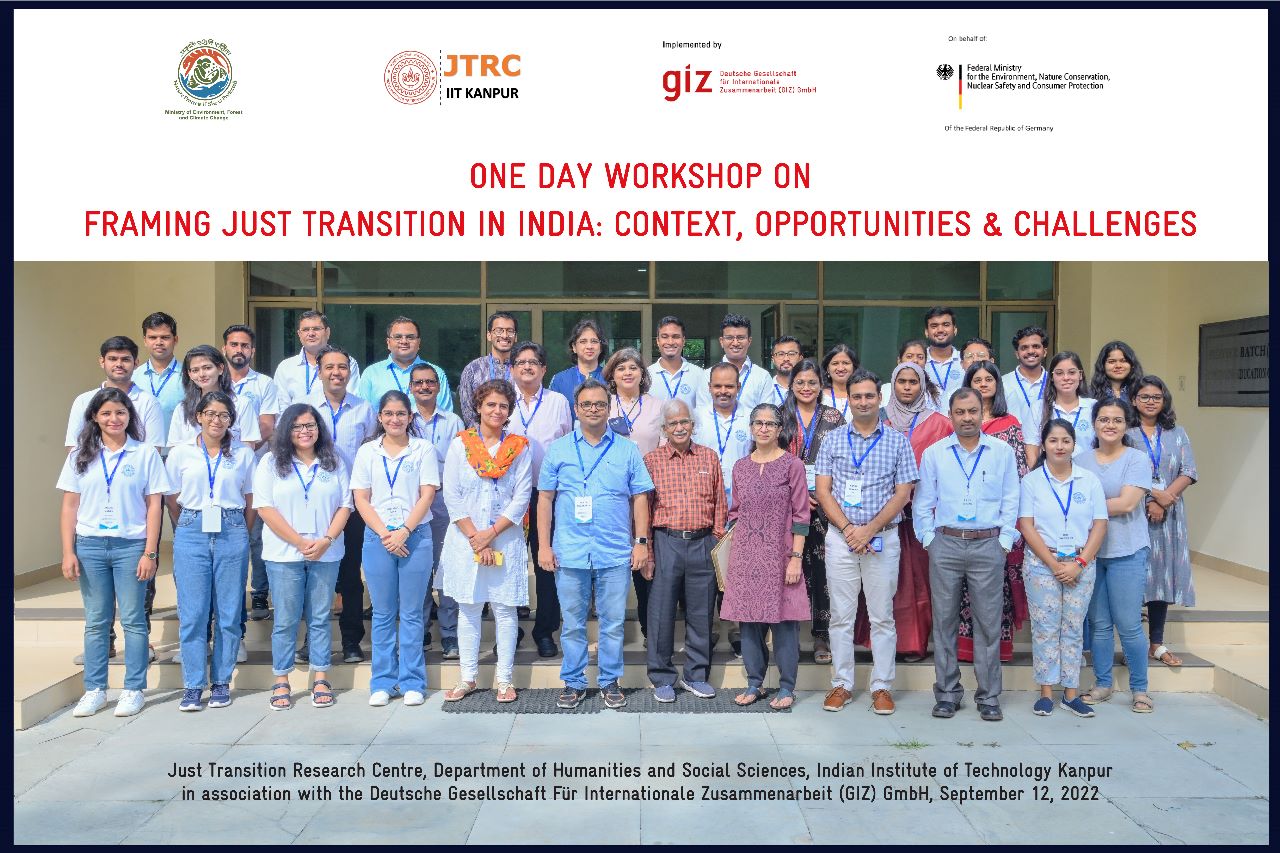
Understanding Key Elements of Just Transition Planning in the Indian Coal Sector
September 1, 2022, 10:00 AM - 3:00 PM
Hotel Hyatt Regency, Salt Lake, Kolkata
In India, while renewable energy deployment is rising rapidly. However, due to the growing energy demand in the country, research shows that coal production and use will continue for a few more decades. While coal will play a crucial role in the India’s energy mix for a few more decades, large numbers of coal mines and power plants are being closed in different states due to economic, safety and environmental reasons. Therefore, even in the short and medium term, substantial just transition policies are required for workers and communities associated with coal mines and power plants that face closure. In the long-term, just transition ideas and planning in India would require significant push as millions of workers and communities, government revenues and various welfare measures are at stake. However, how just transition can be or will be pursued in India is a political and institutional question, which is largely unaddressed so far.
While these elements of just transition provide coal industry and governments useful ideas for future work, more research and discussions are required to clarify the elements further and assess their feasibility of implementation in the Indian context. Given this background, the purpose of this workshop is to narrow down what just transition means for the coal industry and what are some of the key elements of just transition planning in India and how can they be implemented.
The Role of Coal Industry Trade Unions in Facilitating a Just Transition
June 11, 2022
10:00am-3:00pm
Conference Hall, Central Coalfields Limited, Ranchi, Jharkhand, India
In India, while renewable energy capacity has risen by over 18 times in the last 8 years, research shows that coal production and use will continue for a few more decades. This is due to the growing energy demand in India with coal being a key source of energy security. Despite the significant role coal might play in India’s energy mix in the short and medium term, large numbers of coal mines and power plants are being closed regionally for economic, safety and environmental reasons. Therefore, even in the short and medium term, just transition policies will be pertinent for workers and communities associated with those mines and power plants that face closure. Researchers and policy makers pursuing just transitions have time and again reiterated that just transition work requires decades of planning and execution. Therefore, in the long-term, just transition ideas and planning in India would require significant push as millions of workers and communities, government revenues and various welfare measures are at stake. However, how just transition can be or will be pursued in India is an important political and institutional question, which is largely unaddressed so far.
For any just transition planning in India, trade unions will likely play an outsized role as they are an important bridge between the workers and communities and the industry. Given this background, the purpose of this workshop is to narrow down what just transition means for the coal industry and what role can trade unions play in facilitating a just transition.
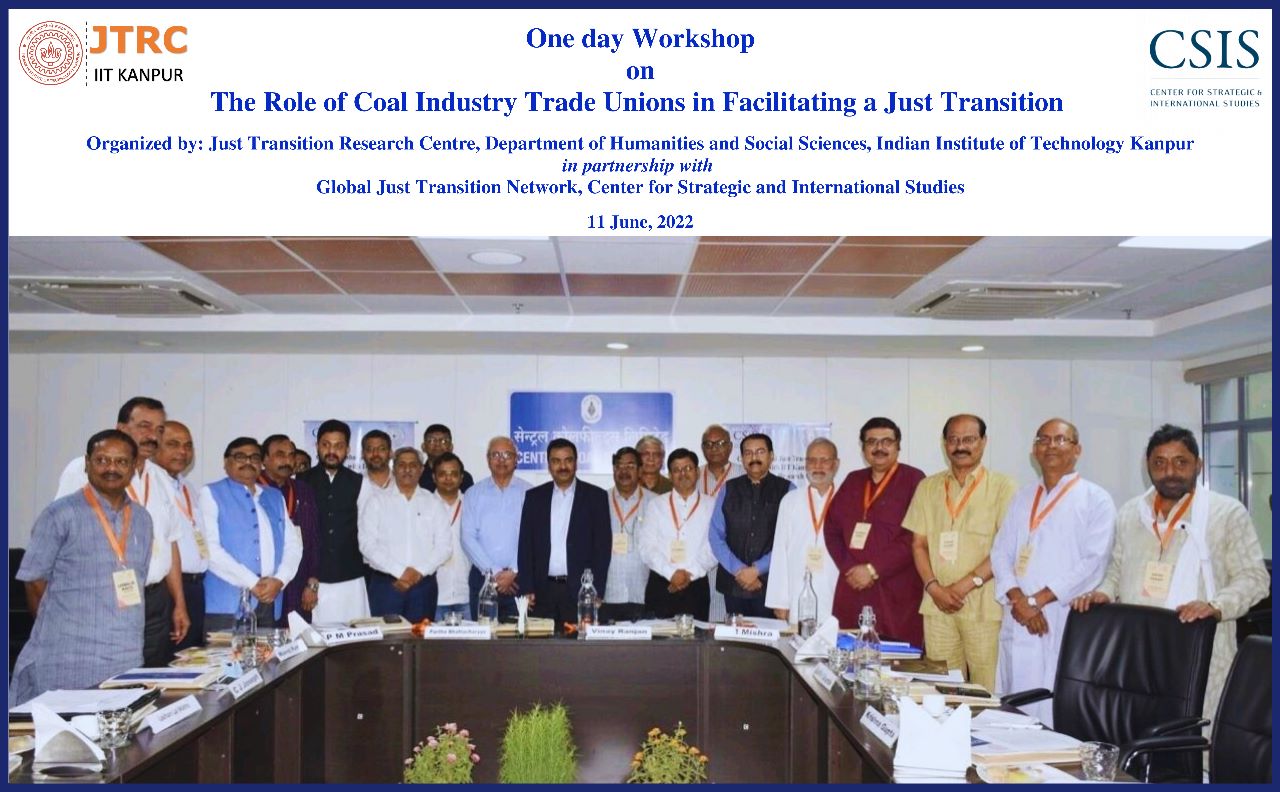
Just Transition Dialogues: A Discussion with Local Stakeholders, West Bengal
20th April 2022
The discussion aims to bring together various stakeholders from the local context to gain a deeper perspective on the energy transition process in West Bengal. Because it is the high time when India has to keep a pace between the energy transition and mitigating climate change effect. Energy transition by phasing down the fossil fuel-based system to renewable ones remain as the critical factor in the climate change discourse. However, we have to take the decisive walkthrough and transformation ensuring the justice for the workers and community who depend on coal for their livelihood across the coal dominant states. While your opinions and reflections on the grassroot problems associated with the energy transition process are valuable to obtain a holistic understanding on the issue.
With this backdrop, this interactive session is an attempt to initiate a discussion on such engagement with the local stakeholders of West Bengal. Discussion will be guided by the following themes:
- Trade Union and Just Transition in West Bengal
- Energy Justice & Just Transition Research at JTRC
- Climate Change and Just Transition
- Land, Livelihood and Job Security in the Face of Just Energy Transition
- The Way Forward for Energy Transition Reality: Connecting with the Stakeholders
- Future Road Map for JTRC and the Local Stakeholders
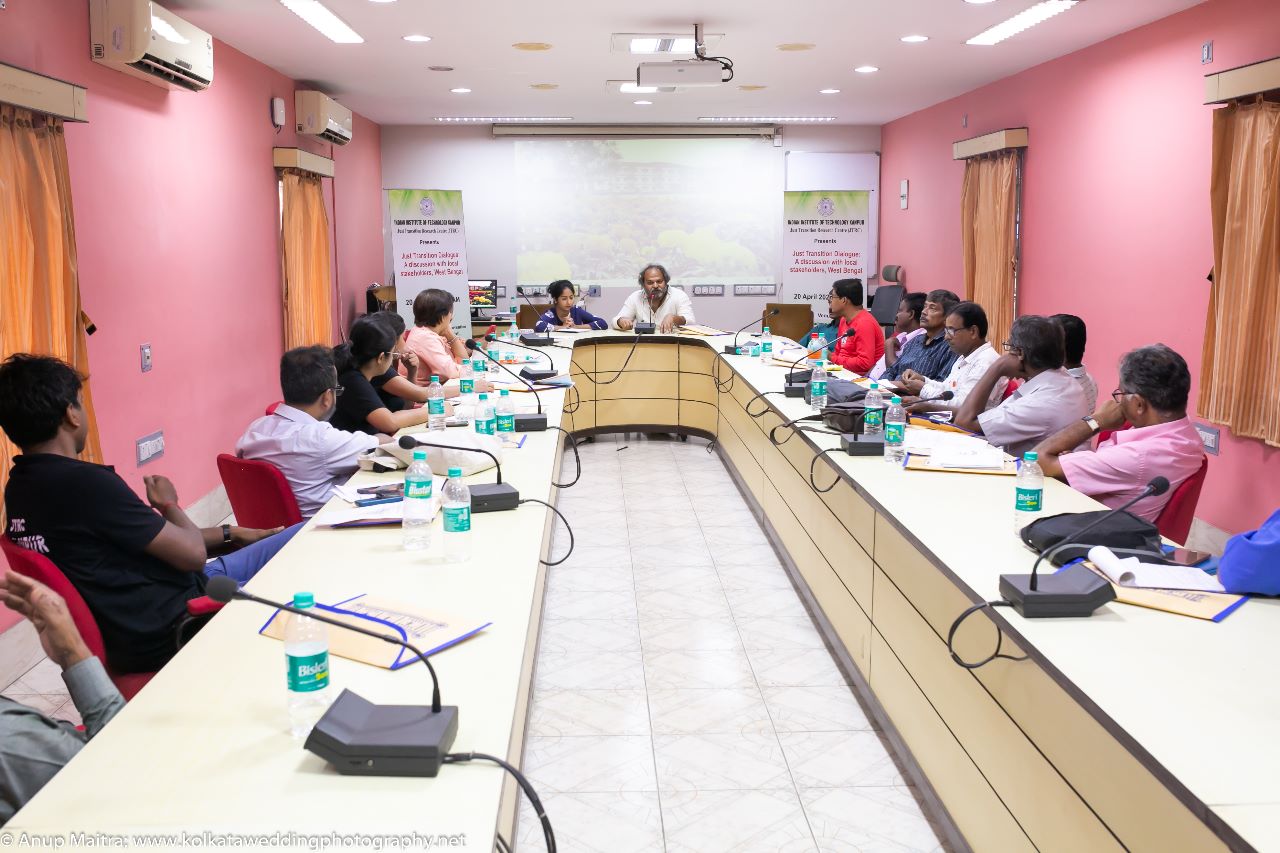
Just Transition Dialogues: Media’s Perspective
Organised by
Just Transition Research Centre, IIT Kanpur
in association with Asar Social Impacts Pvt. Ltd.
Date: April 1-2, 2022
Workshop Venue: IIT Kanpur, Uttar Pradesh
Media can help facilitate a social dialogue from the initial phase of planning and articular, which can highlight the concerns and demands of people working in mines. The focus of research and analysis on just transition has been on definitions developed by a limited group of specialists. This has to be enhanced to include and highlight case studies, vulnerability assessments, transition stages, data insights, and the chain of just transition and where different communities/sectors fit in. The media has a critical role to ensure this is communicated across platforms.
By bringing out information through in-depth reporting styles, state and regional media play a critical role in establishing the narratives of just transition. Given that this is a niche and developing field of research, journalists can structure and prioritise their stories based on an analysis of geographic distribution of burden, impact on youth prospects, access to clean mobility, gender sensitisation, externalised impacts of renewable energy, labour union appetite, and so on.
Objectives:
- To provide a common platform for the journalists to share their insights on just transition
- To map the ways in which media interacts with various other stakeholders in the transition process
- To frame an effective communication strategy for the research outcomes of Just Transition Research Centre, IIT Kanpur
- To promote greater media attention to just transition process that can facilitate building public awareness and effective communication on just transition
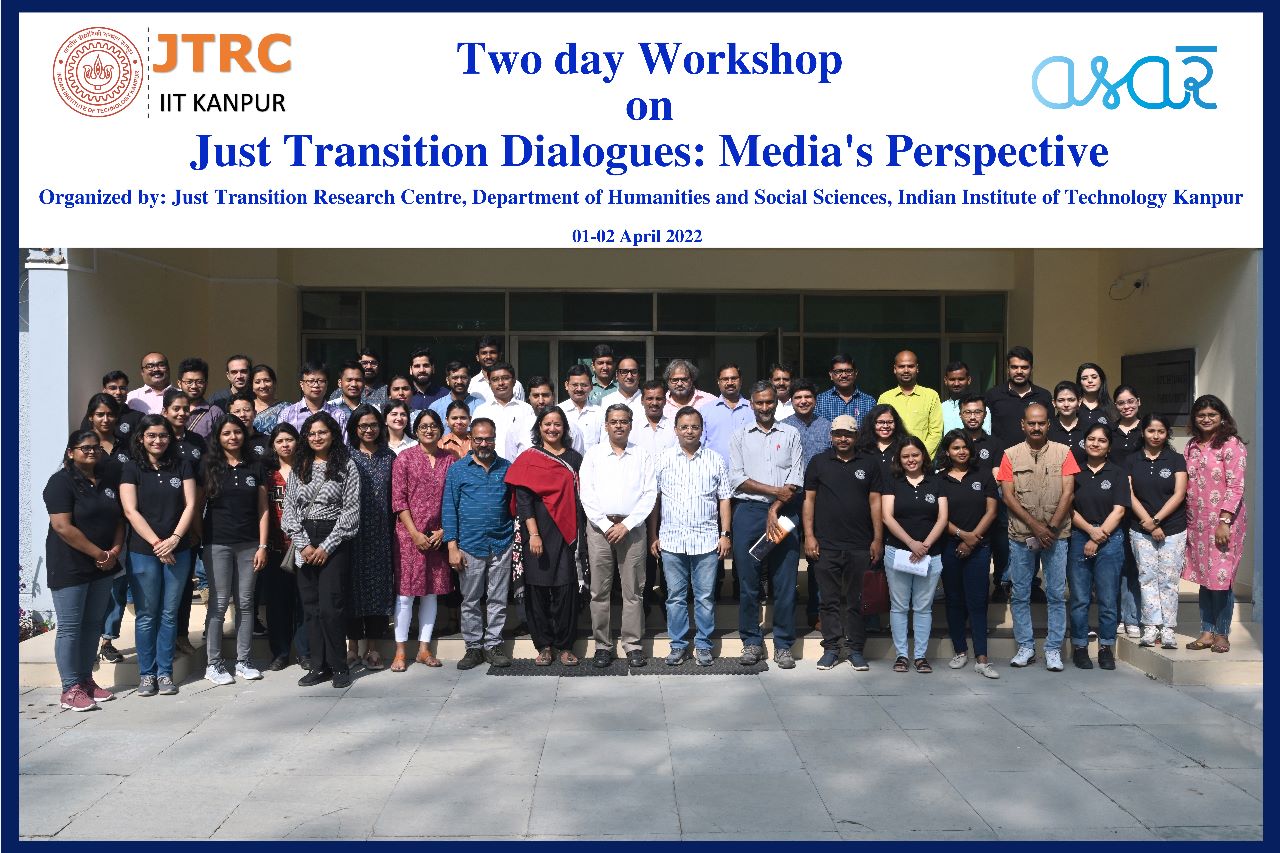
Just Transition Dialogues: Foregrounding the Workforce
13-14 December 2021
In the run-up to the Paris Agreement in 2015, India committed an ambitious target of scaling up its renewable energy capacity by 175 GW till 2022. This was updated to 500 GW in the Glasgow climate conference in 2021. The data and reports suggest that an energy transition from coal to renewables is well underway in India. However, a clear policy roadmap envisioning the nature of interventions to efficiently drive this transition is required. The challenge is to frame a policy that not only governs the techno-economic dimensions of the energy transition but also the human and social aspects of achieving a just transition. To realize this, the acceptance and legitimacy for the new changes must come from the people and communities who are directly or indirectly dependent on the current fossil-fuel sector since this workforce will be most acutely affected by the transition.
The challenge of ensuring this bottom-up legitimacy for the transition process is multifold. First, in India, the coal-rich regions' lack of economic diversification combined with the uncertainties introduced by the current pandemic will further aggravate unemployment and underemployment problems. Second, the coal sector is riddled with crippling inequalities based on indigenous identity, caste, and gender. Third, India's coal-rich regions have historically faced a disproportionate environmental, land, and forest degradation burden. Fourth, as a result of the poor performance by the public sector companies, the alternative of privatization poses a new risk for a workforce that is already struggling with livelihood challenges. This condition is likely to throttle their negotiating power.
The above discussion highlights an urgent need to introduce the notion of justice in the transition process so that the existing structural inequalities are not carried forward to the new energy systems in making. This can be achieved by promoting democratic processes to ensure community and workforce participation in the overall decision making around energy transition. For this, a robust engagement and dialogue with the fossil fuel sector workforce is required especially with the representative trade unions. However, keeping in mind the lack of any clear-cut policy, the nature, scope, potential, and implications of such engagement remain ambiguous, especially concerning the fossil fuel workers represented by a healthy and active trade union network. Till this ambiguity prevails, any policy aimed at governing this transition will remain an ill-conceived endeavour lacking mechanisms to ensure just distribution of cost and benefits in this process.
With this backdrop, this interactive session is an attempt to initiate a discussion on such engagement, especially with the trade unions. Discussion will be guided by the following themes:
- distribution of costs and benefits in the transition process,
- the extent to which the measures employed during mine closure and decommissioning
- are inclusive and participatory, and
- the compensation plans for restoring social and economic security of workers,
- imperilled by the transition.
- the direction and form of future energy systems